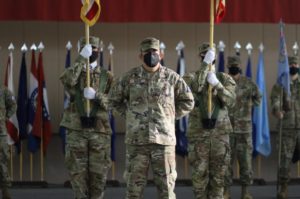Some Prohibit Servicemembers From Visiting Locals Bars, Clubs

Last month, masked soldiers assigned to the 603rd Aviation Support Battalion, 3rd Combat Aviation Brigade, 3rd Infantry Division, stand in formation during the unit’s relinquishment of responsibility ceremony at Hunter Army Airfield, GA. The troops said goodbye to Command Sgt. Maj. Tyrone Murphy Jr. U.S. Army photo by Spc. Levar Adams / 3rd Combat Aviation Brigade, 3rd Infantry Division
FORT STEWART, GA — U.S. military bases around the country—and some around the world—have begun to increase health protection measures to guard against the surge in COVID-19 cases due to variants, such as delta, that have been spreading for months.
According to the national Centers for Disease Control and Prevention, the delta variant now accounts for more than 98% of COVID-19 cases in the U.S. Unvaccinated cases account for 80% of the cases locally, it said, and added that the variant is as infectious as chickenpox and can spread to more people in a shorter time period.
The restrictions appeared to be more common in Southern states, where COVID-19 cases among the unvaccinated have soared with the delta variant and the vaccination rates remain below the national average.
Lt. Gen. Ronald Place, director of the Defense Health Agency, said at a July press briefing that a number of factors go into the decision to tighten restrictions at military bases. In addition to vaccination rates, things such as positivity rates, total number of cases and the vaccination rate in nearby communities can tip the scales in favor of increased measures.
“It’s a multifactorial decision,” Place said.
Last month, Fort Stewart and Hunter Army Airfield in Georgia announced they were prohibiting all of their servicemembers from visiting bars, nightclubs or dance clubs, regardless of vaccination status, effective Sept. 1, under a revised General Order One. Those measures already were in place at other Georgia bases such as Fort Gordon and Fort Benning.
“Georgia has among the highest COVID infection rates in the U.S.—along with one of the lowest vaccination rates,” Maj. Gen. Charles Costanza, commanding general of 3rd Infantry Division, Fort Stewart and Hunter Army Airfield said on the Army’s website. “Our local hospitals are at full capacity and on diversion status for Intensive Care Unit (ICU) beds. We assess our tri-county data every day before we make decisions that impact our soldier’s morale, but this is a health and readiness concern based on facts and data.”
Fort Stewart and Hunter Army Airfield already had requirements that require all personnel to wear a mask inside any facility on- or off-post, so these increased measures are being added to what is already being done.
“While mandatory vaccination is focused on our soldiers, it is also important to offer the vaccine to family members to prevent severe cases that may need hospitalization, and limit spread of the disease. Household spread has increased over the past (weeks) and accounts for over 25% of our cases,” Lt. Col. John Gartside, 3rd ID Division Surgeon, advised on the website.
“Our contact tracing shows that the majority of cases are community spread, outside of Fort Stewart and Hunter Army Airfield and then spread within the household,” added Col. Julie Freeman, commander of Winn Army Community Hospital at Fort Stewart. “Our local COVID positive case rates remain very high. Hospitals in this state and surrounding states are stressed. We have sent patients as far as 300 miles away for a bed in an intensive care unit. We need to be extremely vigilant in the next 30 days with the high transmissibility of the delta variant. Get vaccinated, keep to small outdoor gatherings, wear your mask, wash your hands and remain physically distant.”
At Eglin Air Force Base in Florida, meanwhile, Brig. Gen. Scott Cain, the 96th Test Wing commander, directed Health Protection Condition Charlie, effective Aug. 16, to combat the spread of the virus. The measure means that the base stands at a posture of mission-essential operations only and “aims to continue COVID-19 prevention efforts to protect Team Eglin’s people, resources and to preserve mission capability.”
The HPCON Charlie status changes the Official Business Only posture. Only those conducting official business or residents of Eglin housing and their guests are permitted to enter the base.
Units are encouraged to telework whenever possible, and supervisors must ensure a safe work environment for those who cannot telework and that health protection measures are optimized.
Official Business Only
People will not be allowed to enter Eglin AFB unless they are identified as mission essential, reside in Eglin AFB housing or are authorized limited access, unless granted exceptions by a unit commander or equivalent.
Official business, which includes servicemembers, retirees and their dependents, includes things such as seeking medical care at the MTF; shopping at the commissary; visiting the pharmacy; attending religious services; receiving child-care services; contacting military law enforcement; conducting banking transactions; and providing essential services or supplies to an individual on base and more.
The order also mandated that all military personnel remain diligent about personal hygiene and follow public health risk mitigation measures, including regular cleaning of workplace common areas and limiting all gatherings of 50 people or more.
In July, Fort Rucker, an Army base in Alabama, announced requirements that uniformed personnel not wearing a face mask provide proof of vaccination. The requirement, which came in a general order posted by based leadership, was called the first nationwide in media reports.
“The big difference is going to be that, if you are not wearing a mask, the leadership will be able to ask you, ask soldiers, to prove that they’ve been vaccinated by showing their vaccination card,” according to Maj. Gen. David Francis, the commanding general at Fort Rucker, who appeared in a video posted on Facebook. The order was response to high rates of infection combined with low vaccination rates in Alabama, the video noted.
Not all of the restrictions are in hard-hit areas of the U.S. South, however. The commander of U.S. forces in Korea ordered that, despite vaccination status, troops are not allowed to go to bars and clubs in that area and are required to wear masks indoors in common areas.
“To protect our communities and our mission, we are implementing an immediate, aggressive approach to prevent the virus’ spread any further,” USFK commander Gen. Paul LaCamera said in a statement.

